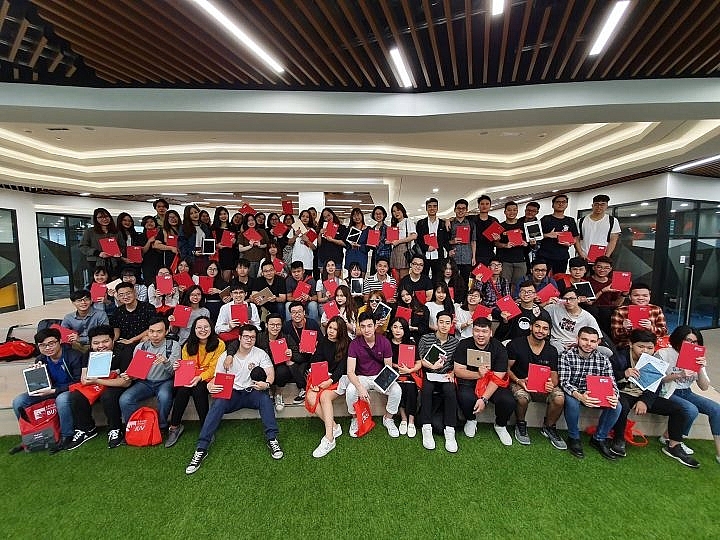E-learning to help create high-quality human resources
 |
| E-learning to help contribute to the high-quality human resource |
E-learning boom in Vietnam
For individuals, online learning through the e-learning system gives them the opportunity to not only increase their knowledge, skills, and qualifications but also have more opportunities to enrich their life, Stewart Utley, lecturer of BUV said at the inaugural research colloquium on international research in Vietnam’s higher education sector, held on July 3 co-organised by the Ministry of Education and Training (MoET), British University Vietnam (BUV) and its partner Staffordshire University (United Kingdom).
In this event, Utley presented to the colloquium about e-learning in the Vietnamese context: trends, challenges, and predictions.
Asia was the second-largest e-learning market among names like Vietnam, Myanmar, Thailand, Malaysia, Indonesia, Nepal, and Pakistan, according to University World News, in 2017.
Vietnam is regarded as a developing country but very active in catching up with the global technology trends. In recent years, e-learning has become a trend here. Vietnam is the country with the highest growth rate in e-learning with 44.3 per cent, passing Malaysia (39.4 per cent), according to Ambient Insight in 2017.
As we can see, in Vietnam, due to uneven economic conditions in regions across the country, investment in education is mostly concentrated in key cities. Major and prestigious universities are mostly located in Hanoi, Ho Chi Minh City, or Danang, leading to the fact that these cities are overloaded with students.
In this context, according to educational experts, e-learning has played an important role in rubbing out the geographical distance, helping students, regardless of where they live, receive the same quality of training, thereby reducing the pressure on the training system, increasing opportunities and facilitating contact with domestic and international courses right in Vietnam.
The forms of e-learning in Vietnam are quite diverse and plentiful, such as short-term certificate courses (English or information technology) and bachelor's degree programmes of the leading universities Vietnam.
The e-learning model in Vietnam is now becoming popular and widely applied in English centres, international schools, and universities. Some of the most prominent names in applying e-learning includeHanoi Open University, Hanoi National University, Vietnam National University in Ho Chi Minh City, and Topica.
According to delegates at in the colloquium, along with its drive for innovation and international integration, Vietnamese higher education needs to be renewed while retaining its main characteristics and approaching the general standards of international education.
If international schools in Vietnam like British University Vietnam (BUV) deployed and integrated e-learning to meet the demand for learning nationwide it will make the higher education market in Vietnam become more exciting and attractive.
BUV pushes digital learning materials
With the aim to improving its students’ learning experience, BUV has become the first higher education institution in Vietnam to provide students with 100 per cent digital learning materials. “This transition aligns with BUV’s philosophy to offer students everything they need to prepare for their dream profession. BUV is positioned as one of leading university providing innovative learning pathways that prepare students for life and work in Vietnam and the world’s emerging digital economy,” said Professor Raymond Gordon, Vice Chancellor of BUV.
 |
| BUV gives every enrolling student an iPad |
The benefits of this initiative for BUV’s students include a personal learning environment and experience that allows every learner to acquire information at their own pace, and have content and frequency of viewing tailored to their own needs, strengths, and passions.
 |
| With the digital learning materials, BUV’s students will benefit from improved learning outcomes thanks to direct access to unlimited and continuously updated high-quality learning resources |
Students can also benefit from improved learning outcomes thanks to direct access to unlimited and continuously updated high-quality learning resources. Moreover, students and lecturers can engage with the content whenever and wherever they want, with interactive tools on any device including mobile devices such as smartphones, iPads, and laptops.
The transition to digital learning and teaching materials reaffirms BUV’s commitment to bringing advanced teaching technologies, methods, and facilities to Vietnam to create an inspiring learning environment for Vietnamese and international students, and help them to prepare themselves for a modern digital workplace in a globalised world.
What the stars mean:
★ Poor ★ ★ Promising ★★★ Good ★★★★ Very good ★★★★★ Exceptional
 Tag:
Tag:
Related Contents
Latest News
More News
- Masan Consumer names new deputy CEO to drive foods and beverages growth (February 23, 2026 | 20:52)
- Myriad risks ahead, but ones Vietnam can confront (February 20, 2026 | 15:02)
- Vietnam making the leap into AI and semiconductors (February 20, 2026 | 09:37)
- Funding must be activated for semiconductor success (February 20, 2026 | 09:20)
- Resilience as new benchmark for smarter infrastructure (February 19, 2026 | 20:35)
- A golden time to shine within ASEAN (February 19, 2026 | 20:22)
- Vietnam’s pivotal year for advancing sustainability (February 19, 2026 | 08:44)
- Strengthening the core role of industry and trade (February 19, 2026 | 08:35)
- Future orientations for healthcare improvements (February 19, 2026 | 08:29)
- Infrastructure orientations suitable for a new chapter (February 19, 2026 | 08:15)



























 Mobile Version
Mobile Version